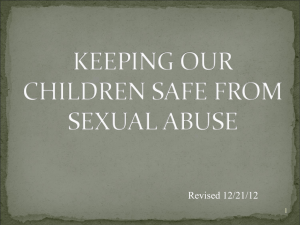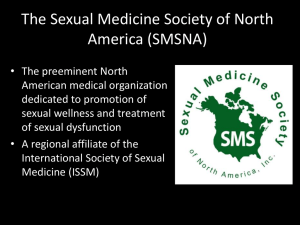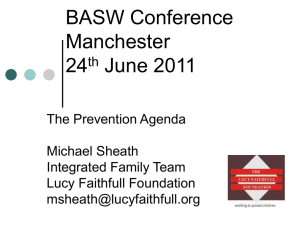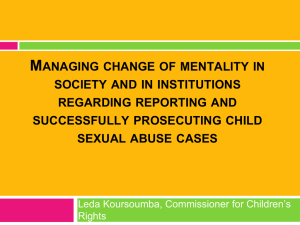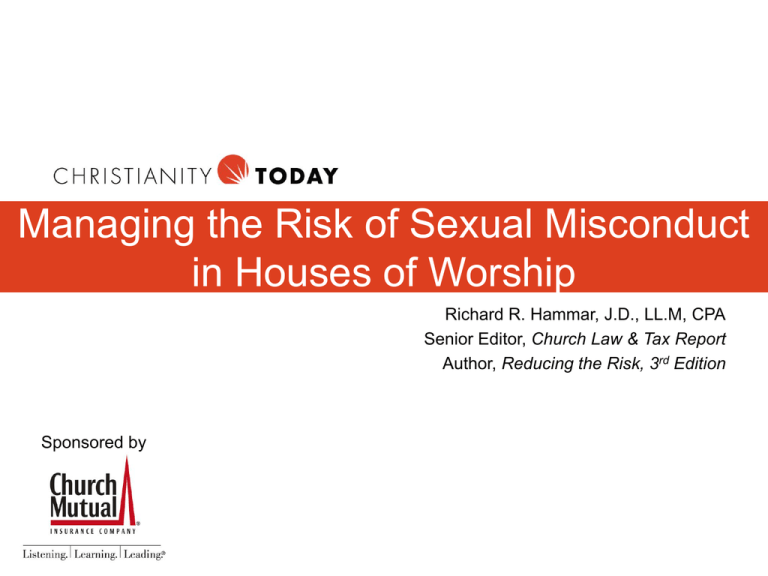
Managing the Risk of Sexual Misconduct
in Houses of Worship
Richard R. Hammar, J.D., LL.M, CPA
Senior Editor, Church Law & Tax Report
Author, Reducing the Risk, 3rd Edition
Sponsored by
5 Kinds of Sexual Misconduct
1. pedophilia
2. ephebophilia
3. seduction
4. sexting
5. sexual harassment
Risk #1—Pedophilia
Definition of “Pedophile”
APA DSM 5 (May 2013)
• Over a period of at least 6 months, an equal or greater sexual
arousal from prepubescent or early pubescent children than
from physically mature persons, as manifested by fantasies,
urges, or behaviors.
• The individual has acted on these sexual urges, or the sexual
urges or fantasies cause marked distress or impairment in
social, occupational, or other important areas of functioning.
• The individual must be at least 18 years of age and at least 5
years older than the child . . . .
Four Unique Characteristics of
Pedophiles
1)
incurability
2)
promiscuity
3)
predatory behavior
4)
high recidivism rate
Liability for Houses of Worship
• negligent selection
• negligent retention
• negligent supervision
• fiduciary duty
Reducing the Risk
•
the 5-step "basic plan"
1.
application
2.
interview
3.
reference checks (institutional)
4.
6-month rule
5.
2-adult rule
additional precautions
6.
criminal records checks
7.
confirm identity
8.
Social Security trace
9.
limit "second chances"
10. staff training
11. be alert to current legal developments
A Useful Question
How would a jury view what we did to
prevent such an incident from
happening?
Two Important Cases
•
the $12.5 million verdict
•
a recent Georgia appellate court ruling
regarding references
Which Crimes are Disqualifying?
Our youth group is planning a short-term missions
trip later this summer. We are conducting
background checks, including criminal records
checks, for the adults who will be going on the
trip. We discovered that one of the adult
workers has a 2007 conviction for resisting
arrest, which is a Class A misdemeanor in our
state. Can we use him?
Responding to Allegations of Child
Abuse
•
Take every allegation seriously.
•
Avoid “denial, minimization, and blame.”
•
Interacting with the family.
•
Be alert to the potential of other victims.
•
Legal advice.
•
Contact your insurance company.
•
Be cautious about social media postings that could be construed
as “admissions against interest.”
Responding to Allegations of Child
Abuse
Comply with child abuse reporting requirements under state law.
•
•
Am I a mandatory or permissive reporter of child abuse under
state law?
If the allegations are true, do they constitute child abuse as
defined under state law?
Do I have reasonable cause to believe that abuse has
occurred?
Does the clergy-penitent privilege protect me from disclosing
this information?
Do I have any risk of civil liability under state law if I choose not
to report the abuse?
The “sleep test.”
The FBI Profile of Molesters
“Adolescent sex offenders should always be
viewed as past or current victims of
sexual victimization.”
Risk #2—Ephebophilia
Two Related Issues
1. Failure to report child abuse
2. Sex offenders attending houses of
worship
Child Abuse Reporting by Clergy—2014
“clergy” are
mandatory
reporters
except for
privileged
information
“clergy” are
mandatory
reporters; no
exception for
privileged
information
all persons
are
mandatory
reporters;
but clergy
not required
to disclose
privileged
information
all persons
are
mandatory
reporters; no
exception for
clergy with
privileged
information
“clergy” as
such not
mandatory
reporters,
but can be if
a teacher,
counselor,
etc. (clergy
privilege
exception)
“clergy” as
such not
mandatory
reporters, but
can be if a
teacher,
counselor, etc.
(no exception
for clergy
privilege)
AL
AZ
AR
CA
CO
IL
LA
ME
MA
MI
MN
CT
MS
NH
WV
DE
FL
ID
KY
MD
TN*
UT
WY
IN
NE
NJ
NC
OK
RI
TX
VA
WA
AK
DC
GA
HI
IA
KS
NY
SD
MO
MT
NV
NM
ND
OH*
OR
PA
SC
VT
WI
State Statutes Allowing Civil Damages for
Failure to Report
•Arkansas
•Colorado
•Iowa
•Michigan
•Montana
•New York
•Rhode Island
“Sex Offenders in the Church”
A 2010 survey by Christianity
Today
Q: Do convicted sex offenders, who have been
released from prison, belong in a church?
-
Yes, as attenders, under continuous supervision, and subject to
appropriate limitations:
-
79%
No, if one or more of the offender’s victims attends the same
church:
24%
-
Yes, as a member:
21%
-
Yes, as an attender with no limitations:
5%
-
Yes, as a leader:
4%
-
No, convicted offenders do not belong in a church:
3%
Q: What factors influence your opinion that sex
offenders should be allowed to participate in
church?
-
Repentant attitude of offender:
Do one or more of the offender’s victims attend the church:
Type of offense:
Terms of the offender’s probation:
Years since the offense occurred:
Number of offenses:
Offender’s reconciliation with victims:
Risk of legal liability for the board:
Awareness in the church of the offender’s attendance:
Statistics on recidivism of offenders:
Insurance company guidelines:
Other:
83%
66%
61%
61%
51%
47%
46%
42%
38%
37%
31%
17%
Risk #3—Seduction (adult
victim)
1. why it happens—transference
2. related risk—false accusations
3. consequences
•
civil liability (for offender and the house of
worship)
•
criminal liability
•
no insurance
•
reputation
•
church discipline
•
“transferring” to another group
Risk Management
1.
third person rule, all cases
2.
third person rule, limited application
3.
women counsel women
4.
architectural considerations
5.
telephone
6.
video cameras
7.
boundaries (counter-transference)
8.
9.
10.
11.
12.
13.
14.
counseling policy
avoid controversial therapies
referrals
insurance
use of term “counselor”
limit “second chances”
employment screening (most frequent
misrepresentation)
15. references
16. social media policy
Criminal Liability
States with a statute making sexual contact
between clergy and counselees a felony:
Arkansas
Connecticut
Delaware
Iowa
Minnesota
Mississippi
New Mexico
North Dakota
South Dakota
Texas
Utah
Wisconsin
Criminal Liability
States with a statute making sexual contact
between “psychotherapists” and counselees
a felony:
Colorado
Georgia
Idaho
Risk #4—Sexting
Case Study #1
• A pastor was convicted of several sexual
offenses involving his sexual solicitation and
molestation of a minor, and sentenced to a
minimum prison term of 186 years. One of his
offenses was “contributing to delinquency of a
minor,” which was based in part on several
sexually explicit text messages (“sexting”) that
the pastor sent to the minor on his cell phone.
2010 WL 10409 (N.C. App. 2010).
Case Study #2
A youth pastor was sentenced to five years in a state prison
as a result of various sexual offenses with a minor female.
The victim had sought out the defendant for counseling as
a result of her depression and suicidal thoughts. An
investigation by the sheriff’s office uncovered text
messages between the youth pastor and victim containing
strong sexual content. His cell phone contained a partially
nude image of the victim, and he sent a partially nude
image of himself to the victim via a text message.
Case Study #2
This evidence was used in prosecuting him for violating a
state law making it a criminal offense for the sexual
exploitation of a counselee by a counselor. The court found
that the defendant, as a youth counselor engaged in
counseling the victim, was a “counselor” and it sentenced
him to a prison term of five years. State v. Duvall, 776
N.W.2d 301 (Iowa App. 2009).
Risk #5—Sexual harassment
Sexual Harassment
Unwelcome sexual advances, requests for sexual favors, and other
verbal or physical conduct of a sexual nature constitute sexual
harassment when (1) submission to such conduct is made either
explicitly or implicitly a term or condition of an individual's employment,
(2) submission to or rejection of such conduct by an individual is used
as the basis for employment decisions affecting such individual, or (3)
such conduct has the purpose or effect of unreasonably interfering with
an individual's work performance or creating an intimidating, hostile, or
offensive working environment.
Questions
More Resources
- ChurchLawAndTaxStore.com:
– Reducing the Risk, 3rd Edition: Keeping Your Ministry Safe from Child Sexual
Abuse
– Draw The Line: Relational Boundaries for Safe Youth Ministry
– Preventing Sexual Misconduct in Youth Ministry
– Juvenile Offenders in the Church
– Sex Offenders in the Church (free to webinar registrants—watch for a follow-up
email)
- ChurchLawAndTax.com
- Church Law & Tax Report
This presentation is designed to provide accurate and
authoritative information in regard to the subject matter
covered. It is provided with the understanding that neither
the presenters nor the publisher is engaged in rendering
legal, accounting or professional service. If legal advice or
other expert assistance is required, the services of a
competent professional person should be sought.



